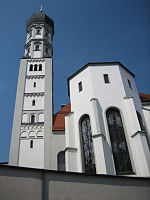Staatstheater Augsburg
Theatres in Bavaria

The Staatstheater Augsburg is a theatre of Augsburg, Germany. Until 1999 it was called Städtische Bühnen Augsburg, from then until the end of August 2018 it was called Theater Augsburg. It offers on four stages musical theatre, plays and ballet, with its own choir and the orchestra Augsburg Philharmonic.
Excerpt from the Wikipedia article Staatstheater Augsburg (License: CC BY-SA 3.0, Authors, Images).Staatstheater Augsburg
Kennedy-Platz, Augsburg Innenstadt
Geographical coordinates (GPS) Address Phone number Website Nearby Places Show on map
Geographical coordinates (GPS)
| Latitude | Longitude |
|---|---|
| N 48.3703 ° | E 10.8925 ° |
Address
Staatstheater Augsburg - Großes Haus
Kennedy-Platz 1
86152 Augsburg, Innenstadt
Bavaria, Germany
Open on Google Maps








